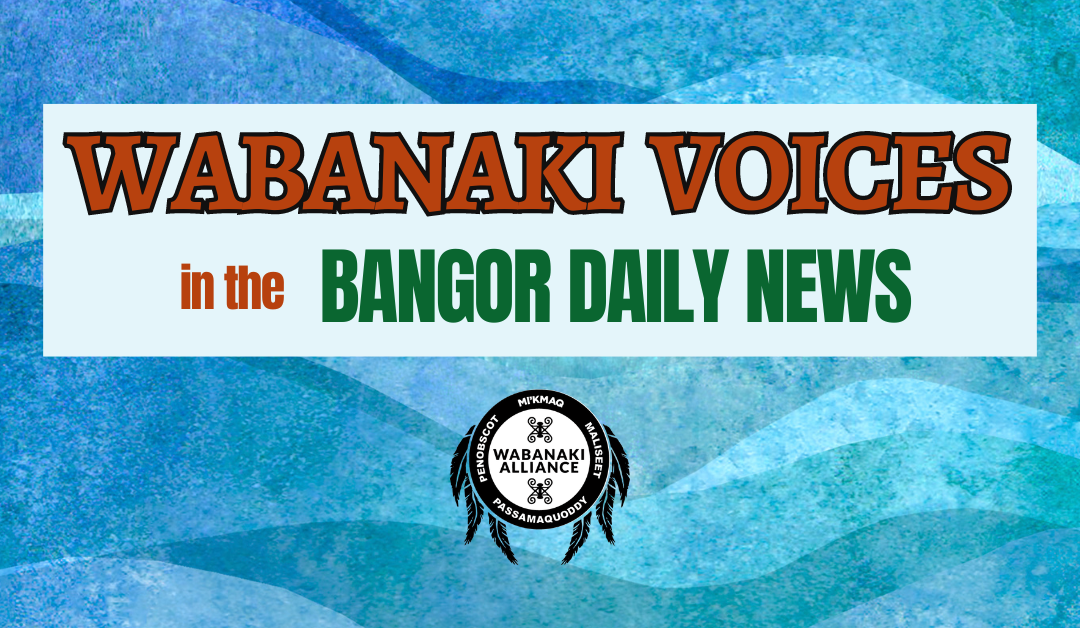Editorial note from the Bangor Daily News: Chief Kirk Francis has served 17 years as the executive leader of the Penobscot Indian Nation. Chief Clarissa Sabattis has served nearly seven years as the executive leader of the Houlton Band of Maliseet Indians. Chief Edward Peter Paul has served over a decade as the executive leader of the Mi’kmaq Nation. This the first column in Wabanaki Voices, a project between the Bangor Daily News and the Wabanaki Alliance to share tribal perspectives in the newspaper’s opinion section. These columns will appear monthly. Read all Wabanaki Voices columns.
Earlier this week a hearing was held in the Maine Legislature’s Judiciary Committee on LD 2007 from Speaker of the House Rachel Talbot Ross. LD 2007, “An Act to Advance Self-Determination for Wabanaki Nations,” is the result of years of work and collaboration and is the latest legislative effort that seeks to amend the 1980 Maine Indian Land Claims Settlement Act in ways that will have a meaningful impact on Wabanaki tribal nations. We are grateful for the support we have received on all of these efforts, and we want to encourage more Mainers to learn about how tribal sovereignty can be beneficial for all.
As three of the elected tribal chiefs in our ancestral homelands now called Maine, we seek to share our reflections on the recent attempts to restore the recognition of inherent tribal sovereignty to our tribal nations and advocate for the continued need to partner with state government leaders and our allies and friends to advance self-determination and equality.
The primary concerns that the tribes have with the 1980 settlement have to do with the ways the language of the settlement has essentially been used to strip us of our rights as federally recognized tribes. The settlement has effectively blocked us from having access to many laws passed at the federal level that would be extremely beneficial for not just our nations but all of Maine. The state has used the settlement to assert authority over our people in a way that is not the norm for other tribes throughout the country. We want to make clear that we don’t begrudge the tribal leaders of 1980 and we honor their hard work and sacrifices. They made a tough decision for the benefit of our nations who had been suffering from generations of trauma inflicted by the state as well as the poverty that accompanies having our land base stolen.
This has never been about getting special rights or taking anything away from the state. This is about parity with other tribes and being good partners with the state. The task force recommendations put forth in LD 2007 is how we work towards these goals.
Previous legislative efforts utilizing the work we did on the task force have had mixed results. The large omnibus bill LD 1626 of the 130th Legislature died on the appropriations table after Gov. Janet Mills expressed opposition to it. Last year, the governor also vetoed LD 2004, which was a standalone bill with the recommendation around federal beneficial acts (which was similar to a federal effort from Rep. Jared Golden which advanced through the U.S. House of Representatives but failed to advance in the U.S. Senate after opposition from Sen. Angus King). These setbacks are frustrating, but we continue to show up in good faith because this work matters to our people and we honor the relationships we have made with so many allies in the Wabanaki Alliance Tribal Coalition.
We have made some progress with the Mills administration and we want to build on that. LD 585 was passed in 2022 and included taxation provisions, a new collaboration policy, and rights to revenue from the new mobile sports betting industry. The governor has also worked with the tribes on solutions to clean up the drinking water for the Passamaquoddy Tribe of Sipayik and has supported efforts from the Mi’kmaq Nation for parity with other Wabanaki tribes. While these measures are helpful, we continue to seek real and lasting advancement for the tribal sovereignty that we maintain we did not cede in 1980 or any year thereafter.
Agreements are rarely set in stone and tribal leaders 44 years ago were under great pressure to accept this settlement under the pretense that we could come back to the table and change it if we needed to in the future. We have put in the work and produced a sound path forward to make the necessary changes. We support LD 2007 because we know that when our tribal nations’ sovereignty is respected we will not only see positive changes for our people, but for our neighbors as well. We invite you to learn more about these efforts and how to join us.





